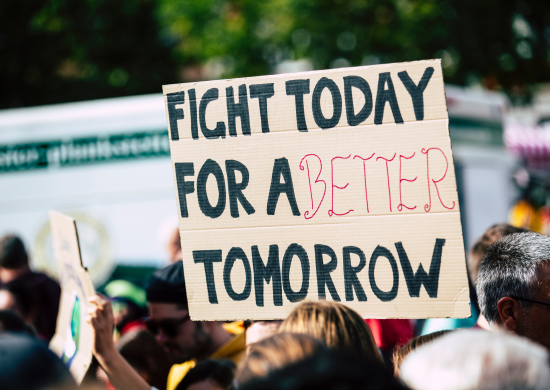Last month, the Pisces Foundation Climate and Energy Team had the opportunity to join our grantee partners in Sharm-El Sheikh, Egypt to attend the 27th Conference of Parties (COP) to the United Nations Framework Convention on Climate Change. At each successive COP the stakes are higher given the unrelenting and increasing impacts of climate change to communities around the world. This means efforts for accelerating and scaling super pollutant mitigation, our strategic focus, are more important than ever. Indeed, curbing emissions of methane, HFCs, and black carbon is the only way to keep temperature change at 1.5°C.
Attending COP was an opportunity to dive into the deep end of climate diplomacy at a critical juncture and engage with grantee-led activities to advance super pollutant mitigation as a just and equitable pathway to meet the Paris Goals. Countries reached a historic agreement on creating a “loss and damage” fund to pay for the impacts of climate change that those least responsible for the climate crisis cannot avoid through adaptation nor by reducing emissions. However, overall mitigation ambition (the reductions in emissions countries commit to) was not raised, the 1.5°C target was potentially weakened and the promised implementation agenda did not fully materialize. Here are the main takeaways for our work:
- The momentum on methane mitigation is strong and so is progress on reducing all super pollutants. This is a bright spot given the failure to raise overall ambition at this COP and is critically important if we hope to stave off the worst impacts of climate change.
- The Global Methane Pledge launched at COP26 now includes 150 countries, with 50 of them either developing or having delivered a methane mitigation plan. Regulatory and other methane progress ahead of COP was impressive and was topped off with China, a top methane emitter that is not yet part of the Pledge, announcing it is working on a plan. The Climate and Clean Air Coalition, the only global coalition of governments and other organizations committed to super pollutant mitigation, hosted a well attended ministerial meeting that also featured progress on black carbon and HFCs.
- The breakthrough on creating a fund for vulnerable countries that are experiencing loss and damage due to our changing climate reflects decades of movement building work.
- This climate justice win was the result of coordinated efforts from a range of advocates building on long-term campaigns to elevate loss and damage as a pillar of the world’s response to the climate crisis. The fund’s critical design elements are to be decided at next COP and there is healthy skepticism in part because promises of climate finance have previously been broken. Time is of essence as many communities are facing irreversible losses of land and culture due to delayed climate action.
- Who shows up matters to the conference outcomes.
- Over 600 fossil fuel lobbyists and too few women represent just some of the discrepancies between who has most influence on the conference proceedings and who is most impacted by climate change. We are not on track to meet our climate goals, and cannot afford another COP where mitigation ambition is not raised and implementation is not facilitated. Tackling the climate crisis equitably whether at COP or in any other venues, will require centering those most impacted in framing solutions.
At the Pisces Foundation we are working to get on track to meeting the world’s climate goals by accelerating the mitigation of super pollutants with a focus on communities that are on the frontlines of pollution and the climate crisis. During our time at COP27, our team saw real progress on super pollutants and climate justice. Traveling through the Blue Zone, we saw vibrant conversations organized by our many grantee partners present about how to build a more just and equitable world by solving the climate crisis, how super pollutant mitigation can support communities’ health, and how philanthropy can better partner with communities. These conversations reinforced that if our climate strategy is not equitable then it is not effective and that investing in movement-building as well as policy advocacy is essential. They also have strengthened our commitment to our strategy and will propel our collaborative work in the coming year!
While no conference is perfect, we hope to continue to see large-scale collaboration on a global stage – we need all hands on deck if we hope to build a world where people and nature thrive together.



